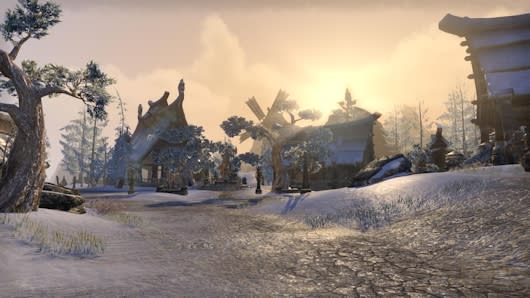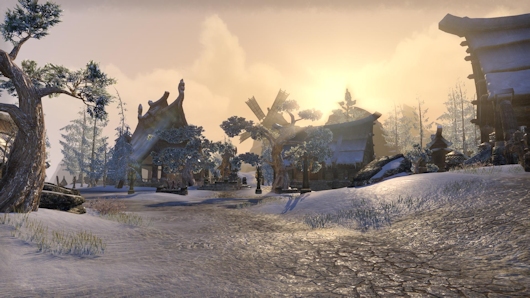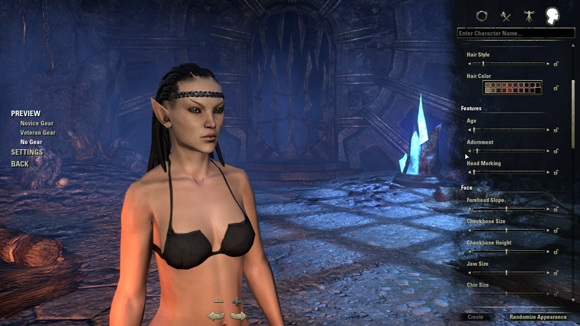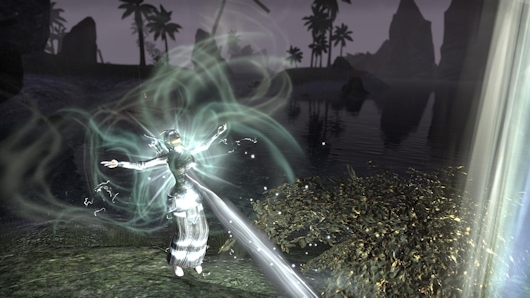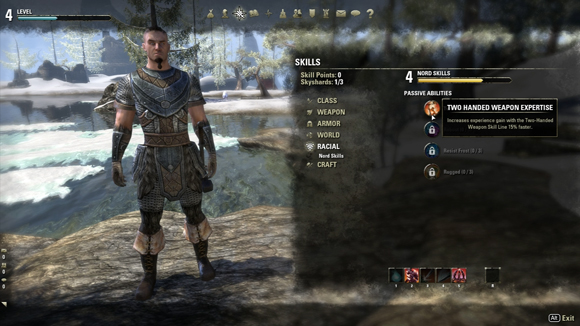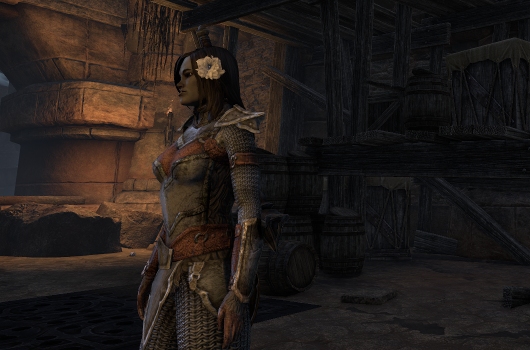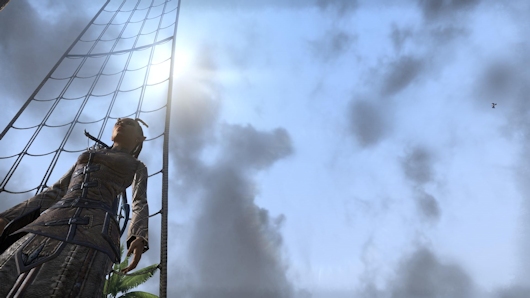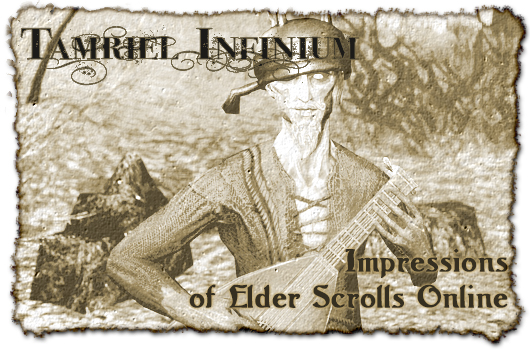The Elder Scrolls Online beta is absolutely nothing special
I've always had a profound antipathy toward the Elder Scrolls franchise. Part of this may very well be timing; the first three major installments released when I didn't have a computer that could handle them (I was generally more of a console gamer), and so I've no memories of happily chugging away across Tamriel as a young lad to sustain me. But I've also never seen anything that's reached out and grabbed me, no inspiring bits of lore, no systems that particularly grab my interest, just the promise that "you can do anything you want" without a great deal of encouragement.
The point I'm making here is that the franchise is not my jam. But that's part of the reason I wanted to try out The Elder Scrolls Online in the first place. Sure, at a glance, it seemed like a fairly generic fantasy RPG that had the weight of a franchise behind it, but that's an evaluation based on nothing but bits of story and gameplay videos. So I settled in over the past weekend to play the beta and see what all the fuss was about, to give it a more fair evaluation than one based simply on the name of the franchise and what I saw at a glance.
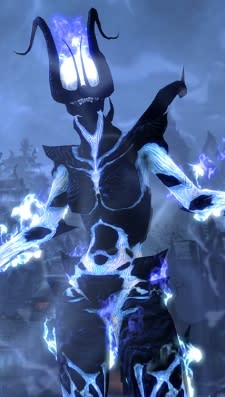
In hindsight, I think my knee-jerk first impression was a bit kinder than the game deserved.
Character creation in The Elder Scrolls Online, to its credit, is charmingly robust in terms of body type. My High Elf could be built the way I wanted her -- tall, lanky, and athletic. The options did exist for making her more of the standard buxom fantasy girl or a stout, doughy type if I'd prefer, which I appreciate. Early videos made it appear that women were fairly thin even when the character creator cranked bulk up to max, but there are more sliders that do allow you to edit that. So that's welcome.
Character faces all seem to have a certain funerary pall over them, but that's one part uncanny valley and two parts the style the games have always been in, I suppose. It's a solid character creator, and I heartily endorse it.
After creating my character, I was promptly informed that I had died, waking up in the realm of the dead. (Or something; our ESO columnist Larry informs me that Coldharbour isn't exactly the realm of the dead, and I'm sure he knows what he's talking about. I cannot say I'm horribly concerned about the distinction.)
Upon waking up, I was greeted by a wizened old mentor who could be Dumbledore, Obi-Wan Kenobi, Medivh, or if you're feeling cheeky, Lord British. He informed me that I was terribly important and needed to go find Jennifer Hale (voiced by Jennifer Hale in what may be the Jennifer Hale-iest role conceivable), who would tell me what to do and then gamely follow behind me.
Shortly thereafter, I engaged in my first bout of combat. Which was... disheartening.
In defense of TESO, I don't know how much of the combat was built around what the single-player games play like; the best I can say is that it looked similar to what I saw on display in Skyrim, which isn't exactly a compliment in my eyes but might be exactly what fans are looking for. There's your grain of salt to munch on, as it were. But combat certainly didn't make me want to play the earlier titles in the series.

 |
The mechanics are fairly straightforward. Left-click to swing, right-click to block. Press both mouse buttons at the same time to use an interrupt. Double-tap a direction to dodge that way. You have five active abilities activated by the number keys; magical ones consume magicka, physical ones consume stamina, as does blocking and interrupting. For the core of an active combat, it all sounds quite solid.
In practice, though, the whole thing feels terribly floaty. I never had the sense of crisp action-and-response I got in titles like WildStar or TERA; characters seemed to drift about a bit, swinging slowly, moving slowly, with each fight marked by a very simple flow. Block this, interrupt this, dodge that. And picking the wrong one doesn't work -- you can't block something that should be interrupted or dodged, and so forth. Again, perhaps this is all second-nature to fans of the single-player installments. I don't know.
My first two-handed skill also had the advantage of not seeming to do much of anything. Indeed, it felt like neither of the attack skills I had by the time I stopped playing the beta had much if any impact, turning most battles into a matter of mashing on the left button until A Thing happened, reacting to the Thing, and then continuing to click over and over until it was dead, possibly using my healing spell in the midst. Perhaps it's because I picked a Templar, or perhaps two-handers are always like that, but the result was that combat felt bland, tedious, stiff, and wholly lacking in impact.
There was also quite a lot of it, but I'm getting ahead of the tutorial zone. John Cleese showed up, which was charming insofar as I immediately said, "That's John Cleese!" I don't think the script made use of the man's enormous talent, but that's not really the fault of the game. John Cleese sent me crawling through a cave, and in there I started exploring the wonders of dodging traps and picking through crates.
Let me tell you this: If you like looting crates, ESO leaves everything else for dead. There are crates and backpacks and boxes and barrels all over the place. And what are they filled with? Lockpicks. Tons of lockpicks. Lockpicks seem slightly more numerous than insects in this world, making it a wonder that anyone bothered developing locks.
I came across one locked item in the game, incidentally, which informed me that I could not pick the lock under any circumstance. So that's awesome.
At any rate, I was then treated to a sequence in which Ms. Hale sacrificed herself in what might have been a poignant scene had I cared remotely about these characters. As it stood, it was lackluster. Things happened, exposition was hurled about, and off I went back to the land of the living to do something. Then the questing started up in earnest.
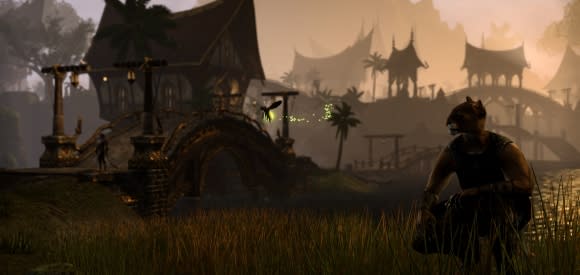
ESO is not a game dotted with quests. The flip side is that the quests it does have are long. Very long. You aren't doing a dozen different quests in a zone, but that's because each quest is a seven-step venture that fills the same functional niche. It's debatable whether or not this is better than having a series of smaller quests. On the one hand, you avoid running back to a hub every few seconds to keep being told what to do next. On the other hand, you spend a long time completing one objective or another and wondering whether you're even close to being done yet.
The setup also gives the distinct sense that the game is very, very proud of its storytelling, an assumption borne out by the game's proud assertion that you can play through other factional storylines after you hit the level cap. That pride seems... misplaced, I'll say. Perhaps I'm a cynical old bastard, and I'm sure someone will happily hop to the comments to criticize some other bits of storytelling I like, but the whole thing came off as hopelessly, painfully generic.
This was not helped at all when the game actually did offer me a choice of what to do next. One quest involved the murder of an elven diplomat at the hands of the most obvious suspect in the world, and at the very end you have a choice: let the diplomat's wife kill the murderer or bring him to justice. It's an old scene, but it's one replete with potential drama, considerations of both sides, the prospect of making an enemy of a woman whom you sympathize with...
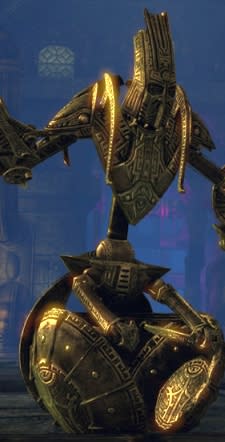
Wait, what's that? I talk to her for half a minute, and she just agrees to do what I want? That's somewhat less dramatic than I had expected. At that point, the whole drama vanishes into a happy vacuum, never to be spoken of again. If it gets brought up again in a way that matters later in the game, I would be very impressed; I certainly didn't get the sense that my choice would matter, nor did I ever see any sort of fallout from the choice I did make.
Am I nitpicking? Sort of. But considering that one of the big selling points for endgame in ESO is going back and doing the other factional storylines, I would hope that those stories are interesting, with a few twists and turns here and there. Perhaps it's too early to tell, but if I'm bored with a book on page 20, odds are I'm not going to tough it out for another 300 pages afterward.
I also didn't see much else off the beaten path that would give me reason to head into the wild blue yonder. Somewhere in the back of my head I seem to recall that you could supposedly find reasons to explore in the game; what I saw when I wandered around off the beaten path was another quest. In fairness, quests in ESO are meaty affairs, so it's not as if I just found a task to kill a dozen squeaking rodents, but the sense I got from this was less "stuff all around" and more "it's like vanilla World of Warcraft where there aren't really solid hubs."
Maybe this changes in the higher levels. But then, maybe all of this is better as you get further on. But that's cold comfort if you aren't having enough fun to keep playing to find out, isn't it?
Crafting had a similar "might get better as you go on" feel to it. There are obviously a lot of moving parts to massage and plenty of things to customize whilst crafting. The use of skill points to advance crafting skills seems like a slightly odd choice, unless the game throws more skill points at you or crafting nets you experience. Unfortunately, I apparently hadn't picked over enough bits to check out the crafting in depth; it does seem to have a fair amount of stuff to chew on, which should satisfy those looking for a reasonably deep system.
Skill points deserve a nod of approval. You use things, and your skills increase; as your skills improve, you can spend skill points (earned via leveling up, hunting for shards a la Guild Wars 2's skill point locations, or quests) to earn active and passive abilities. I quite enjoyed the fact that this trickled down to abilities, as well; after repeatedly using my (largely worthless) first two-handed skill, I had the option to morph it into one of two skills, one of which was more defensively focused and the other more aggressively.
I did encounter plenty of oddities. Armor skills, for instance, seemed to be quite firmly tied to particular playstyles, so there's little point to wearing heavy armor on a damage-oriented character. I also noticed no skills that specifically centered around gaining and holding threat, just a lot of skills centered on survivability. I'm going to give the game the benefit of a doubt and assume that I simply didn't notice the threat skills, or maybe there's another tanking mechanic that I'm not familiar with; otherwise I can see a lot of group combat devolving into the same sort of uncontrolled chaos of Guild Wars.
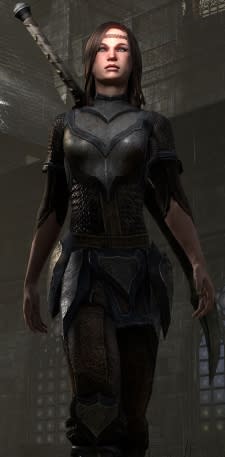
That minor thrill, however, was not nearly enough to get me invested in the game. Indeed, the only thing that did keep me invested was trying fruitlessly to find something that I could point to and say, "This is why you should care about this game." And I kept coming up short. When all was said and done, the only real mark I could find unambiguously in its favor was the name, and that seems like a particularly poor conclusion.
The trouble, ultimately, is that ESO is not a terrible game. It's functional, as it should be with release just around the corner. But it means that instead of being an endearing so-bad-it's-awesome sort of game, it winds up coming across as bland, unimaginative, and boring. Everything it's doing has been done better in other games, and while I keep thinking, "Maybe there's a more fun game over the next rise," my experiences over the beta weekend didn't make me at all eager to keep digging for it.
But if all of that still comes across like so much bleating, I'd raise the question of why we're 56 days out from launch and only now able to talk about impressions of the game outside of specific media tours at conventions. One wonders whether management is completely aware of how weak the game feels overall. Certainly this doesn't imply confidence with the product.
The last game I played that kept its NDA up this long before launch was Final Fantasy XIV's first incarnation, and that had brilliant ideas but terrible execution. This game has solid execution; it's just rather dry on creativity. Combine that with a pre-order bonus that pushes you to order the game sight unseen and a CE that offers an entirely separate race, and I'm leery. I won't say that the whole thing is just a cash grab -- obviously the developers want to make as much money as possible -- but I suspect that the studio knows the game isn't ready for prime time but isn't terribly interested in fixing it without seeing whether it's profitable.
And right now, I don't feel this game is worth your time. If you want a fantasy MMO based on quests, there are buckets of options even if you don't like World of Warcraft, most of which manage to do a better job with various aspects of gameplay while feeling far less generic. Lord of the Rings Online, Guild Wars, Final Fantasy XI, Final Fantasy XIV... heck, if you really aren't satisfied without a personal narrative and somewhat floaty vaguely active combat, Guild Wars 2 exists, and while that game has its own problems, it delivers on most of the points that ESO seems to want to. It lets you build the sort of character you enjoy playing, and it also offers lots of reasons to explore over the horizon; yes, most of them are marked with waypoints, but they're not just another set of quests.
Maybe there's something else. Perhaps I'm just missing some key piece of information, some concept that will tie the whole game together. Perhaps if I just press a little further I'll see what makes people excited for the game. Perhaps I'm just completely wrong and not the target audience at all, but I've been trying to see what's there to like about the game even if I don't intend to play it over the long term. But there comes a point when you have to stop giving the game chances to win you over, when you have to say that it's giving you little reason to praise it at all. There comes a point when you just have to say, "No, this is in fact not all that good."
Unless you're an enormous fan of the Elder Scrolls franchise, there's not much to recommend ESO right now. It's another generic fantasy MMO in a field already filled with them. And I just don't get it.
Don't miss the rest of Massively's Elder Scrolls Online media NDA lift coverage!

